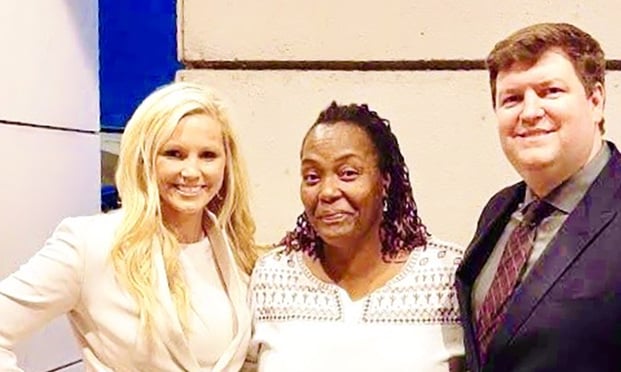State Farm Hit With $1M Verdict After Shunning $200K Offer in Tricky Car Wreck Case
Lawyers for the injured driver said they had to overcome issues at trial, including a prior wreck their client did not initially disclose.
February 06, 2020 at 05:22 PM
4 minute read
 Bethany Schneider (from left) with plaintiff Christine Montague and fellow attorney Steven Newton. (Courtesy photo)
Bethany Schneider (from left) with plaintiff Christine Montague and fellow attorney Steven Newton. (Courtesy photo)
A Fulton County jury on Wednesday awarded more than $1 million to a woman rear-ended in Sandy Springs when another vehicle unexpectedly stopped in front of her.
Attorneys for the plaintiff, who suffered neck injuries requiring surgery, said the defense ignored an offer to settle the case for $200,000 last year. They will seek attorney fees under Georgia's offer of judgment statute, which allows a party whose offer to settle was rejected and who later prevails by 25% or more than was demanded to seek fees from the time of the spurned offer.
Attorney Steven Newton of Fayetteville's Richard D. Hobbs & Associates said he also sent a demand for the defendant's $250,000 policy limit last Friday, but there was no response.
The highest offer to settle from the defendant driver's insurer, State Farm, was $20,000.
Newton and co-counsel Bethany Schneider of Schneider Injury Law said there were a couple of tricky angles to the case, including a prior wreck that injured their client and the unrelated death of the defendant driver during the pendency of the case.
"We had a big concern about how a jury would feel about awarding against the estate," Schneider said.
There was also a short-lived mistrial when the issue of insurance was raised before the jury the of trial, requiring that panel to be dismissed and another brought in, they said.
Downey & Cleveland partner W. Curtis Anderson defended the case with firm colleague James Cannella Jr.
Cannella said they were considering all their options including an appeal.
"We have already ordered the transcript," he said via email.
According to the lawyers and court filings, the accident happened in 2014 when Christine Montague was preparing to turn off the exit ramp from Ga. 400 onto Northridge Road.
Montague hit the brakes when a truck in front of her stopped suddenly, but a Ford Explorer driven by Melanie Norvell was unable to stop in time and slammed into her Toyota Avalon.
Montague, now 53, suffered head, neck and back injuries, and her Toyota was a total loss.
She underwent a variety of treatments and finally had disk fusion surgery in 2016, ultimately accruing nearly $85,000 in medical bills.
Montague first filed a complaint in Forsyth County, where Norvell lived, but it was transferred to Fulton County State Court in 2017. Norvell died in 2018, and her estate was substituted as the defendant.
The defense claimed the wreck was caused by the unknown truck driver who stopped in front of Montague. The defense filed a notice of nonparty fault, but Judge Fred Eady granted her lawyers' motion for a directed verdict dismissing that argument at trial.
"The defendant has the burden of proving the third party is the proximate cause for all of the plaintiffs injuries; it can't be 'may be' liable," Newton said.
During a three-day trial, Newton and Schneider said the main defense centered on assertions that Montague suffered a neck injury in a head-on collision in 2007—a fact she did not initially disclose to her lawyers.
"That was a huge issue to overcome, but it actually turned out to be good for our case, because the medical records showed she didn't have these injuries back then," Schneider said.
At closing, Montague's lawyers suggested damages of $847,000 to $2.4 million.
After about 2½ hours of deliberation, the panel awarded $1,051,800 on Wednesday evening, including $964,000 in past medical expenses and past and future pain and suffering, and $87,000 in future medical expenses.
Newton said the jury was eager to leave, but he spoke to one juror who said they were not convinced by defense claims that Montague tried to cover up her medical history.
Defense lawyer Anderson "did a good job poking holes, but we were able to go back and put the records in context," he said. "There were arguments that there were misrepresentations, but the jury saw through that."
Newton and Schneider hailed the defense's handling of what they said was a lot of conflicting evidence.
"They tried a really good case, going through and finding inconsistencies," said Schneider. "It sure didn't feel like a slam-dunk at trial."
This content has been archived. It is available through our partners, LexisNexis® and Bloomberg Law.
To view this content, please continue to their sites.
Not a Lexis Subscriber?
Subscribe Now
Not a Bloomberg Law Subscriber?
Subscribe Now
NOT FOR REPRINT
© 2025 ALM Global, LLC, All Rights Reserved. Request academic re-use from www.copyright.com. All other uses, submit a request to [email protected]. For more information visit Asset & Logo Licensing.
You Might Like
View All
Insurer Not Required to Cover $29M Wrongful Death Judgment, Appeals Court Rules

Trying to Reason With Hurricane Season: Mediating First Party Property Insurance Claims


'I Thank You': Attorney Leverages Daily Report Article to Turn $42K Offer Into $600K Settlement
7 minute readTrending Stories
- 1Relaxing Penalties on Discovery Noncompliance Allows Criminal Cases to Get Decided on Merit
- 2Reviewing Judge Merchan's Unconditional Discharge
- 3With New Civil Jury Selection Rule, Litigants Should Carefully Weigh Waiver Risks
- 4Young Lawyers Become Old(er) Lawyers
- 5Caught In the In Between: A Legal Roadmap for the Sandwich Generation
Who Got The Work
J. Brugh Lower of Gibbons has entered an appearance for industrial equipment supplier Devco Corporation in a pending trademark infringement lawsuit. The suit, accusing the defendant of selling knock-off Graco products, was filed Dec. 18 in New Jersey District Court by Rivkin Radler on behalf of Graco Inc. and Graco Minnesota. The case, assigned to U.S. District Judge Zahid N. Quraishi, is 3:24-cv-11294, Graco Inc. et al v. Devco Corporation.
Who Got The Work
Rebecca Maller-Stein and Kent A. Yalowitz of Arnold & Porter Kaye Scholer have entered their appearances for Hanaco Venture Capital and its executives, Lior Prosor and David Frankel, in a pending securities lawsuit. The action, filed on Dec. 24 in New York Southern District Court by Zell, Aron & Co. on behalf of Goldeneye Advisors, accuses the defendants of negligently and fraudulently managing the plaintiff's $1 million investment. The case, assigned to U.S. District Judge Vernon S. Broderick, is 1:24-cv-09918, Goldeneye Advisors, LLC v. Hanaco Venture Capital, Ltd. et al.
Who Got The Work
Attorneys from A&O Shearman has stepped in as defense counsel for Toronto-Dominion Bank and other defendants in a pending securities class action. The suit, filed Dec. 11 in New York Southern District Court by Bleichmar Fonti & Auld, accuses the defendants of concealing the bank's 'pervasive' deficiencies in regards to its compliance with the Bank Secrecy Act and the quality of its anti-money laundering controls. The case, assigned to U.S. District Judge Arun Subramanian, is 1:24-cv-09445, Gonzalez v. The Toronto-Dominion Bank et al.
Who Got The Work
Crown Castle International, a Pennsylvania company providing shared communications infrastructure, has turned to Luke D. Wolf of Gordon Rees Scully Mansukhani to fend off a pending breach-of-contract lawsuit. The court action, filed Nov. 25 in Michigan Eastern District Court by Hooper Hathaway PC on behalf of The Town Residences LLC, accuses Crown Castle of failing to transfer approximately $30,000 in utility payments from T-Mobile in breach of a roof-top lease and assignment agreement. The case, assigned to U.S. District Judge Susan K. Declercq, is 2:24-cv-13131, The Town Residences LLC v. T-Mobile US, Inc. et al.
Who Got The Work
Wilfred P. Coronato and Daniel M. Schwartz of McCarter & English have stepped in as defense counsel to Electrolux Home Products Inc. in a pending product liability lawsuit. The court action, filed Nov. 26 in New York Eastern District Court by Poulos Lopiccolo PC and Nagel Rice LLP on behalf of David Stern, alleges that the defendant's refrigerators’ drawers and shelving repeatedly break and fall apart within months after purchase. The case, assigned to U.S. District Judge Joan M. Azrack, is 2:24-cv-08204, Stern v. Electrolux Home Products, Inc.
Featured Firms
Law Offices of Gary Martin Hays & Associates, P.C.
(470) 294-1674
Law Offices of Mark E. Salomone
(857) 444-6468
Smith & Hassler
(713) 739-1250






